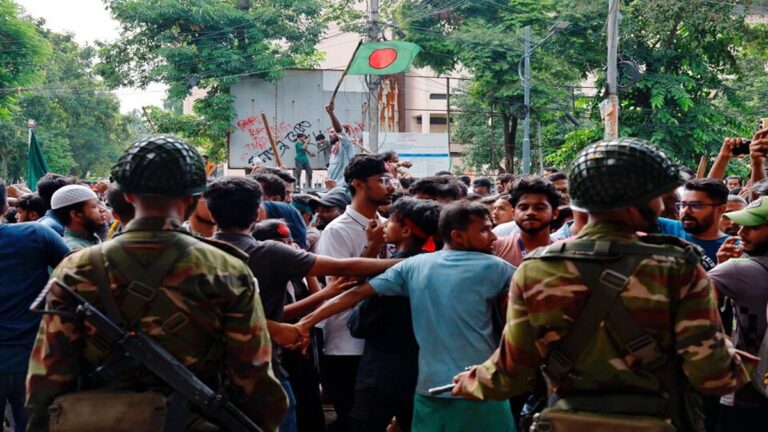South Asia has been plagued by increasing uncertainty in recent months, and rising tensions in Bangladesh signal a potential escalation of tensions in the region. The potential for conflict grows as President Mohammad Yunus’ interim government moves closer to Pakistan and Myanmar’s Arakan Army expands closer to the Bangladeshi border. Amid these changes in power relations, the question arises: Is Bangladesh preparing for war? If so, who are they preparing to fight?
Bangladesh military buildup: A sign of things to come?
Bangladesh has visibly stepped up its military preparations in recent months, leading to widespread speculation about its intentions. While inspecting recent military exercises in Chittagong, interim government leader Mohammad Yunus urged Bangladesh’s military to prepare for war. He emphasized the importance of constant readiness to protect the country’s sovereignty, which coincides with increased interest in military modernization.
These military exercises involve tanks, helicopters, and artillery, and are used for routine training as well as serving as a signal to internal and external stakeholders. Yunus’s words suggesting the need for continued preparations raised eyebrows given the broader geopolitical context. Is Bangladesh preparing for an impending conflict? If so, who are the potential enemies?
Yunus and U-turn in India relations
Although Yunus has called for military preparedness, the government’s diplomatic actions tell a different story. One of the key developments that raised concerns in New Delhi was Bangladesh’s decision to purchase light tanks from Turkey, apparently for deployment along the Indian border. These Otkal Talpar tanks have links to conflict zones and even terrorist organizations such as ISIS, further deepening suspicions about Bangladesh’s intentions.
At the same time, the Yunus government reversed course diplomatically by canceling a judicial training program for 50 Bangladeshi judges planned in India. The training program, originally scheduled to be held in Bhopal, was aimed at fostering judicial relations between the two countries. The sudden cancellation, which was described as a routine administrative decision, comes amid growing anti-India sentiment in Bangladesh and signals a cooling in relations. A move closer to Pakistan and away from India may be politically expedient for the caretaker government, but there are alarms in New Delhi about the future of bilateral relations.
General Waqar uz-Zaman: A voice of caution amid rising tensions
In contrast to the government’s actions, Bangladeshi Army Commander General Waqar-uz-Zaman has emerged as a rare moderate voice. Despite the current political changes and the caretaker government’s growing proximity to Pakistan, Zaman has consistently emphasized the importance of maintaining good relations with India. In a series of statements, he made it clear that Bangladesh would never do anything that would undermine India’s strategic interests. Zaman’s remarks reflect a pragmatic approach that recognizes the deep interdependence between the two countries, particularly in trade, health care and regional stability.
But Zaman’s position is not without controversy. His comments are further complicated by his role in the political drama surrounding Sheikh Hasina’s ouster, his ties to the previous government, and questions about his loyalty to the interim government. Given the government’s aggressive stance towards India, Yunus may not fully support Zaman’s cautious stance. The growing divergence between the military leadership and the transitional government could portend greater instability to come.
Myanmar’s Arakan Army: A growing threat on the border
As if Bangladesh’s domestic political crisis and strained relations with India weren’t enough, the situation is now exacerbated by the growing influence of the Myanmar-based rebel Arakan Army, which has gained significant territory near the Bangladeshi border. has become even more complex. Recently, the Arakan Army claimed to have captured Maungdaw, a town directly adjacent to Cox’s Bazar in Bangladesh. This strategic location, coupled with the rebels’ success in capturing key military positions in Myanmar’s Rakhine state, has put Bangladesh’s border security on high alert.
The Arakan Army, which aims to establish an independent Rakhine state, is increasingly cooperating with other rebel groups in the region. If this alliance consolidates, the rebels could soon move deeper into Myanmar’s Rakhine state, creating a more unstable environment for Bangladesh. The Arakan Army’s proximity to the Bangladesh border raises concerns about possible cross-border rebel activity, which could further destabilize the region.
Bangladesh’s security forces, already busy with domestic unrest, could face a new and more powerful threat from rebel groups operating along the country’s borders. The risks are higher than ever as the military braces for potential escalation on multiple fronts.
Bangladesh’s diplomatic dilemma: A nation between allies
With Pakistan’s growing influence and the dissolution of diplomatic relations with India, Bangladesh is at a crossroads. Relations with India have deteriorated over the past year, particularly after the coup that ousted Sheikh Hasina. India has expressed concern about the treatment of Bangladesh’s religious minorities, especially Hindus, and the tensions have spilled over into the diplomatic arena. Bangladesh’s request that India extradite Hasina only adds fuel to the fire, complicating an already delicate situation.
However, despite increasing friction, there are efforts to maintain some degree of cooperation. For example, the two countries have recently been working on fishermen exchanges across their maritime borders. This small but important gesture reflects an underlying desire to keep diplomatic channels open amid rising tensions. But with the military focused on modernization and the government pivoting to Pakistan, it remains unclear whether these diplomatic exchanges will be enough to prevent further deterioration.
Is war inevitable?
Military rhetoric, rising defense spending, and shifting alliances all indicate the region is bracing for potential conflict, but it remains to be seen whether war is truly on the horizon for Bangladesh. is premature. The country’s leadership, split between the military and a transitional government, faces an uphill battle balancing internal political struggles, external threats and fragile relations with neighboring countries.
As Myanmar’s insurgency continues to destabilize the region and Bangladesh’s military posture becomes more aggressive, the question remains whether war is inevitable. Time will tell whether Bangladesh will be able to weather this period of instability without sparking wider conflict, or whether the tensions that are brewing will eventually develop into something far more dangerous for South Asia. You’ll understand. For now, we are watching the region closely, recognizing that the stakes are high and the risks even higher.







